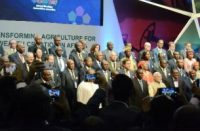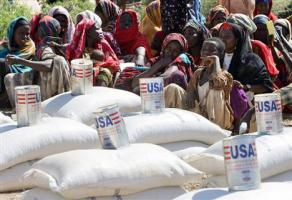BY ANDUALEM SISAY GESSESSE – Ahmedabad, India
The world has passed various development stages to reach where we are today. Starting from agricultural and industrial and information revolutions to the recent various innovations such as, Nano technologies our planet is going through rapid changes.
Yet Africa seems stuck somewhere – it still talks about the need for agricultural revolution to feed its people.
Even though many African countries have shown better economic performance in the past few decades, the continent is still unable to feed itself. For instance, if take Ethiopia, which has been boosting for its double-digit GDP growth, is still not able to feed its people.
The country is either dependent on food import or food aid or both. As a result of shortage of food, it is now common to see long lines of people even in the capital Addis Ababa waiting buy government imported and subsidized wheat flour, cooking oil and sugar, among others.
Likewise almost all African countries have failed to fill the bellies of their fast growing people. The continent’s spending on food import has been increasing reaching $35 billion per year.
If the continent continues sleeping on its fertile land and continues abandoning its poor farmers, the food import bill of the continent is estimated to reach $110 billion by 2025 when the current total population of the continent is expected to reach around 2 billion.
On the contrary reports show that the continent’s fertile land is estimated to feed the whole world if properly used.
That is why the African Development Bank (AfDB), one of the major development financier of the continent focused on how it can transform agriculture of the continent its 52nd annual meeting held in Ahmedabad, India. The Bank chose to hold its meeting in India to learn from the country how it has managed to end food import in just 3 years.
Abandoned African farmers
“The greatest challenge for Africa’s smallholder farmers is, we don’t hear their voice. Politicians go to them during elections. And immediately after the election is over, they forget about them. So, there has to be accountability by political leaders for the poverty that we see,” says Akinwumi Adesina, President of AfDB.

To address the critical food shortage of the continent, AfDB along with other partners such as the African Union and the United Nations Economic Commission for Africa launched the feed Africa program in 2015.
Feeding the continent through agricultural revolution is one of the top five investment priorities of AfDB along with industrialization, integration, and energy as well as job creation for Africa whose 60% population is young. One of the needs for African agriculture revolution is to make the sector attractive for the youth and create jobs, according to the Bank.
“I have never seen a farmer who wants to be poor. And I have never seen a farmer who wants to be substance farmer because they are subsistence not by choice. It is because they don’t have access to technologies; access to finance; access to market; access to infrastructure. All farmers want to send their kids to good schools like you and myself. They want to have a good house that we all have,” Adesina said.
Increasing its investment on agriculture sector of Africa, it has invested a total of $10 billion in 2016. In addition to its plan to spend $24 billion on agriculture development in Africa in the coming ten years, the Bank is also working to mobilize funding from across the world to increase its spending.
“If you can get agriculture to perform in the way that is expected, then we are going to see the poor people really move up the economic ladder. So to me the most important thing is, for the African Development bank to really focus on the development of agriculture in the continent,” says Dennis Rangi (PhD), Director General at the Development Centre for Agriculture and Bio-science International.
Recent trends such as the El-Nino induced droughts in eastern and southern parts of Africa also shows that food insecurity in Africa may even get worse because of climate change and variability.
In addition increased food demand and changing consumption habits along with rapid expansion of urbanization is also mentioned as one of the major contributor of increasing expense of Africa on food import.
“I came out of poverty and poverty is not pretty. So what we have to do is we have to move the boundary conditions around smallholder farmers. Give them to better financing, technologies, market, infrastructure, information. If smallholder farmers of India are able to give the world India’s green revolution, why is it smallholders of Africa cannot give Africa a green revolution?” Adesina asks.
He believes that the only difference is in India at that time the farmers were broadly supported.
“In Africa way too long the farmers have been abandoned. Literally it is like taking somebody put him on a rickety boat, you ask him to hit the Mediterranean Sea or the Indian Ocean left alone for the forces of nature. That is how much we have abandoned farmers in Africa. I think it is time to end the abandonment of farmers in Africa,” Adesina says.
Changing perception
Currently out of five one person in Africa is undernourished. Land security and good are also major challenges in Africa, which is often mentioned as contributor for poor performance of the continent’s agriculture.
What is been described as ‘land grabbing’ recently in some African countries such as Ethiopia, Tanzania among others shows that land security is becoming a major concern.
In Africa agriculture contributes to 60% of the jobs even though it is not getting the attention it deserves from the public and governments.
“We want to change how people look at agriculture. We don’t want people to look at agriculture it is what poor people do. I am not denying that reality today. But there are lots of successes in agriculture that we can talk about…We got to change perception of that kind, Adesina said.
[embedyt] https://www.youtube.com/watch?v=ZjmjLdXV9vc[/embedyt]
For the continent, which now exports raw tomatoes and imports tomato catch-up, it is estimated that Africa can generate $100 billion revenue per year if it substitute the current import and began processing locally its own agricultural outputs by adding value.
“When I was minister of agriculture in Nigeria, I wore my ties all the time. I want all the people in the country to know that you can understand agriculture. You can do agriculture and that is cool and you can also make a lot of money from agriculture. Agriculture is not only about poverty. You can be very rich person doing agriculture. That is why we say can create wealth for millions of people from agriculture,” Adesina said.
Including those who struggle to eat once in a day, 420 million people in Africa were under extreme poverty in 2015. If the trend continues the number is anticipated to reach 550 million by 2025.
“For us to transform agriculture for wealth creation in Africa, we need to invest heavily in agriculture,”says Mr. Amadou Sanneh, Minister of Finance and Economic Affairs of The Gambia.
Technology
Low productivity is often mentioned as one of the major reasons for the continent’s failure to feed itself and reduced competitiveness of its products in the market. Researches have been suggesting for the need of technologies that makes African farmers more productive and their products more competitive.
“We have to upgrade our farming system. The traditional hoe and manpower cannot solve our problem. We need mechanized agriculture and reduce post-harvest losses through agro-processing of farm products,” Minister Sanneh says.
AfDB believes that there are enough tested agricultural technologies and practices. “The question is how to take those technologies to scale to reach tens and millions of farmers. That is the issue,” Adesina said.
As example he raised new rice variety, which give four times higher yield than what farmers are currently getting. He also mentioned better yielding ranging from a cassava that gives up to 18 tons per hectare, water efficient and drought tolerant maize to tissue culture bananas varieties.
He says one of the financing areas of AfDB includes a program called technologies for African agricultural transformation, the platform that aims to take all the available technologies to tens of millions of farmers.
“I have no interest at all in small pilots [programs]. Africa has had too many pilots but when you look there are no planes taking off. We have to move up scale,” he said, mentioning that his Bank is working with the World Bank on the program to invest over $900 million,” Adesina said.
To reach millions of African farmers with the technologies AfDB is currently partnering with relevant institutions such as, International Institute of Tropical Agriculture, the International Crop Research Institute in India where Dr. Adesina started his career, among others.
“We see the AfDB as a very key player on the continent to help not just to increase financing but also ensure that policies and strategies are optimized to achieve the intended purposes of structural transformations,” says Mr. Admassu Tadesse, President and Chief Executive of Eastern and Southern African Trade and Development bank (TDB).
Smart subsidy
Report shows that transforming Africa’s agriculture and making the continent food self-sufficient by 2025, requires the continent to spend from $315 billion to $400 billion every year.
Without a different approach, it is unlikely to expect African governments to respect their Abuja promise where they agree to spend 10% of their GDP but failed to do so.

That seems the reason the African Development is now calling for smart subsidy for African farmers. “I think it is time for broad policies that provide subsidies in a smart way for African farmers,” he told reporters at the closing of the conference.
“If OECD countries can provide subsidies for millionaires United States can provide subsidies for very rich farmers, why is it that African governments are not supporting their own farmers? We must not abandon our farmers. We must strongly support them,” Adesina urged African governments.
But the Bank also thinks about preparing African youth today for the jobs of tomorrow and help the continent close to the rest of the world. AfDB is currently investing on 230,000 African youth to make them qualified computer coding professionals that prepares them for the jobs of tomorrow such as, robotics, bio-science and Nano technologies among others.
For now how soon the continent stops thinking about the basic – food- and join the rest of the world to embrace the latest technologies is what time can only tell.
